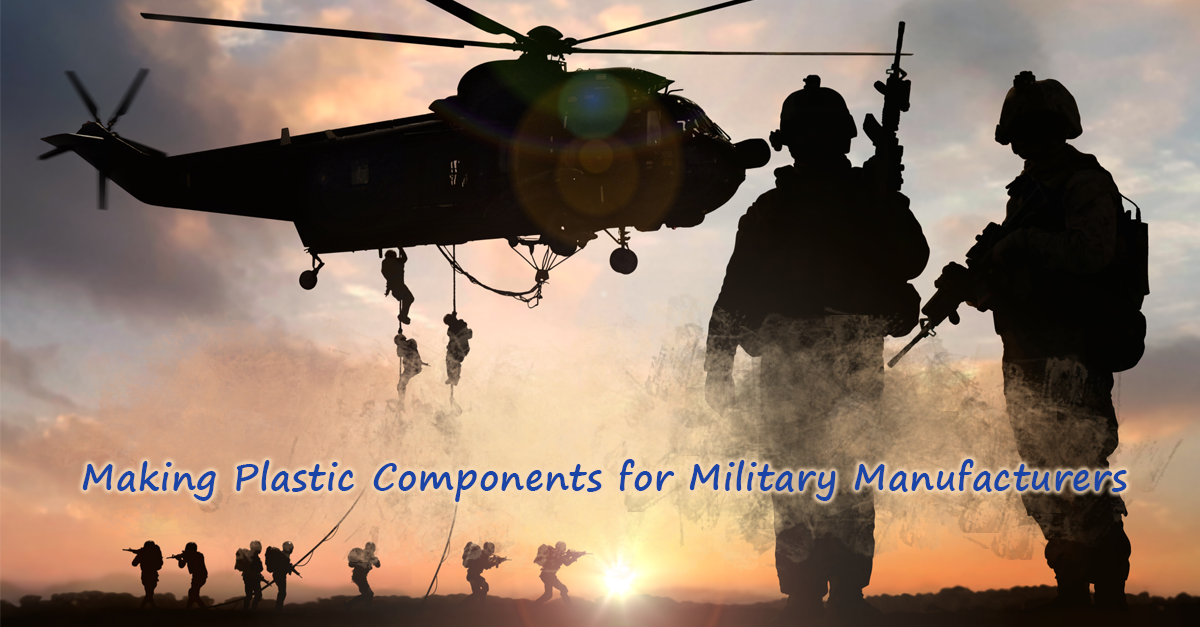Military components must withstand harsh conditions and not fail. On the battlefield, a malfunctioning device might be the difference between life and death for our military family.
Fortunately, you can use plastic injection molding for military applications like battery packs, weaponry, munitions, and decoys. Plastic injection molding ensures you get military-grade equipment that endures severe combat-zone conditions and offers you substantial longevity.
This piece discusses military component manufacturing demands and why plastic injection molding is fast-becoming mainstream for various military applications.
Military Demands That Dictate Military Component Manufacturing
Manufacturing military components is a hyper-sensitive process as it directly impacts national security. That’s why the U.S. Department of State established the International Traffic in Arms Regulations (ITAR) to oversee the manufacturing, exporting, and trading of military components and devices.
Being an ITAR-registered manufacturer, Crescent Industries understands the exceptional demands of military component manufacturing. In all our military injection molding projects, we guarantee durability, reliability, and repeatability.
Let’s discuss some of the military's top plastic injection molding applications.
Hand-Held Communication Devices
Hand-held, Manpack, and Small Form Fit (HMS) components facilitate real-time communication between dismounted troops and command centers. These devices use complex printed circuit boards that can damage easily if exposed to rough weather conditions like excess moisture and heat.
Also, contacts for charging these battery backs and handheld devices can use the process of insert molding. Therefore, an injection molder partner skilled at manufacturing these inserts and performing an insert molding process is necessary. Plastic injection molding creates durable weather-proof casings that protect HMS devices in harsh environments ensuring they function optimally at all times.
Binocular & Monocular Housings
Binocular and monocular scopes are a must-have in military operations for optical enhancement. For example, soldiers often attach a monocular scope to their rifles to enhance long-range shooting accuracy. Additionally, soldiers use night vision binoculars to improve their vision in low-light environments.
These costly night vision binoculars and monocular scopes are exposed to harsh environments where they can easily sustain damage. However, using plastic injection molding advanced technology, weather-resistant binocular and monocular housings can be made. These housings protect your monocular scopes and night vision goggles from environmental damage and absorb shocks from falls and wobbles.
Weaponry
Traditionally, most military weapons were made from metal, making them bulky and expensive to assemble. But as plastic has gained more utility in military weapon manufacturing, weaponry components are lighter and abrasion resistant. As a result, plastic is now used to manufacture a range of high-precision weapon parts.
Decoys
Decoys play a critical role in military deception to bluff enemy observers. Using plastic injection molding, manufacturing the decoy components or devices is faster and more cost-effective. Additionally, plastic injection molding boosts product repeatability and reliability, facilitating quick manufacturing of decoy components in scale.
Advantages of Plastic Injection Molding Military Components
There are many reasons injection-molded plastic parts are gaining mainstream use in defense and military component manufacturing. The most potent benefits include the following:
A Wide Array of Plastics Available for Injection Molding
Some of the primary plastics compatible with military applications include:
- Polyvinyl Chloride (PVC)
- Polyetheretherketone
- Thermoplastic Elastomer
- Polypropylene
- Polyester
- Polyphenylene Sulphide
- Acetal
- Polyamide 6
- Thermoplastic Polyurethane (TPU)
Because these plastics have unique properties, they’re used for molding different military components. For instance, PVC is rigid, flexible, and flame-resistant, whereas polycarbonate material is used for dimensional stability.
Plastics Are Lightweight
Soldiers carry loads of gear during combat, from water and food supplies to utilities such as rechargeable batteries and munitions. It’s mission-critical for soldiers to have the required equipment but with lesser weight. Thus, injection molding military applications that were once metal make them lightweight and boost troop mobility.
Flexibility In Design for Manufacturability (DFM)
Innovative plastic injection molding techniques such as insert molding and overmolding provide ergonomic benefits and a more significant customization margin for high-precision and specialized equipment.
Additionally, if you need robust parts with bolstered corners or higher vibration-damage protection, overmolding enables you to add extra features to satisfy your desired mil-spec.
Durability and Dependability
Every day military components, from small to large, must be reliable and sturdy to withstand rough operational conditions and work optimally. With plastic injection molding, you are confident that all your products meet or exceed expected standards.
Why Trust Crescent Industries?
Crescent Industries is the top-rated, seasoned manufacturing partner for military and defense molding services. Our experience manufacturing defense products goes back to WW11, when we were trusted to make gun turret castings and helm column castings for the famous PT gunboats.
Since then, we have enhanced our manufacturing proficiency and invested in state-of-the-art manufacturing facilities to take on bigger and more complex military component manufacturing projects.
We are ITAR registered, compliant with NIST regulations for cybersecurity, and working toward CMMC certification.
As an employee-owned company, we take enormous pride in our injection molding projects, especially molding military components.
Contact us today at 717-896-1576 and let us know your military specifications requirements for your plastic injection molding projects, and we’ll be happy to deliver unparalleled results.
Sources:


